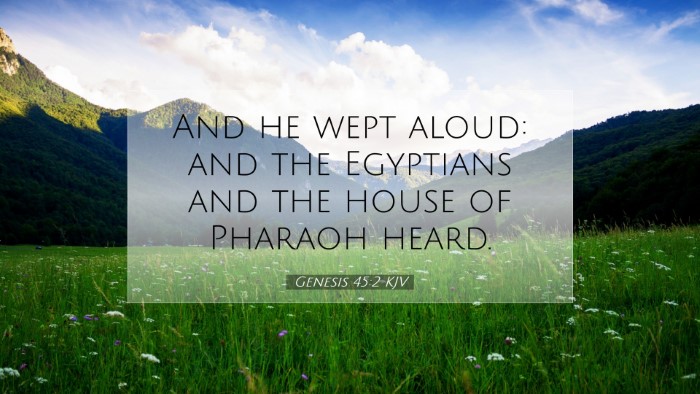Commentary on Genesis 45:2
Verse: “And he wept aloud: and the Egyptians and the house of Pharaoh heard.”
Introduction
Genesis 45:2 captures a pivotal emotional moment in the narrative of Joseph, a favored son who became a powerful leader in Egypt. This verse focuses on Joseph's deep emotional response upon revealing his identity to his brothers. The significance of this moment resonates with themes of forgiveness and reconciliation.
Contextual Analysis
This passage marks a critical turning point in the story of Joseph. Throughout his trials, Joseph maintained his faithfulness to God. Now, as he reveals himself to his brothers, the emotional intensity stems from years of suffering and separation as well as the impending forgiveness.
Joseph's Identity Revealed
Joseph, once a mere dreamer, now stands as a prominent leader in Egypt. His identity has evolved in tremendous ways, and the revelation of his true self to those who betrayed him is profound. Albert Barnes describes this revelation as a culmination of God's purposes through Joseph's hardships.
The Emotional Outburst
Joseph's weeping ("wept aloud") signifies more than personal grief; it indicates the overwhelming burden of years of resentment and joy cast aside. Adam Clarke notes that such deep emotion indicates both his sorrow for the past and joy for the reconciliatory moment with his brothers.
Insights from Commentaries
- Matthew Henry: In his commentary, Henry emphasizes that Joseph's tears express both forgiveness and compassion. His willingness to let go of past grievances exemplifies the Christian call to forgive those who wrong us.
- Albert Barnes: Barnes posits that Joseph's weeping serves dual purposes: it is a moment of personal release and a reminder to others of the pain caused by betrayal. This public display of grief aligns with the Hebrew tradition of expressing emotions openly.
- Adam Clarke: Clarke provides an understanding of the cultural context, explaining that in ancient Near Eastern societies, public displays of emotion were normal among family. Joseph's tears would resonate with his brothers, expressing his emotional burden and highlighting their restored relationship.
Theological Implications
This verse raises fundamental questions regarding forgiveness and the dynamics of family relationships. Joseph’s actions demonstrate how faith can guide one towards reconciliation, regardless of past wrongs. His embrace of his brothers signifies a break from hostility and encourages healing.
Forgiveness as a Divine Principle
The act of Joseph forgiving his brothers echoes the central message of the Gospel. It portrays the idea that true forgiveness is not merely an act of the will but involves a deep emotional transformation. Matthew Henry articulates that Joseph’s willingness to forgive reflects God’s grace towards humanity.
The Role of Emotion in Reconciliation
Joseph’s emotional expression can be seen as a powerful tool in the process of reconciliation, serving as a reminder that healing often requires vulnerability. Baptist theologians suggest that crying is not a sign of weakness but rather strength, showing our capacity for love and relationships.
Practical Applications
Pastors and theologians can draw several applications from Genesis 45:2. Understanding the significance of Joseph's emotional ache can enrich sermons focusing on forgiveness, emotional authenticity, and the importance of restoring relationships.
1. The Necessity of Emotional Expression
Joseph’s example encourages believers to embrace emotional transparency. It is vital for individuals in the church to express their struggles and work through interpersonal conflicts.
2. Embracing Forgiveness
The act of forgiving those who wronged us is a central tenet of Christian living. This passage challenges readers to reflect on their relationships and the need for reconciliation.
3. Reflection on God’s Sovereignty
Joseph’s journey highlights the sovereignty of God amidst suffering. The path taken by Joseph demonstrates that God can turn misfortunes into divine providences for greater purposes.
Conclusion
In conclusion, Genesis 45:2 serves as a profound expression of human emotion intertwined with divine providence. Joseph's example of weeping and reconciling with his brothers should inspire both pastoral caregivers and congregations alike to pursue heartfelt relationships grounded in grace and forgiveness.
By reflecting on the insights from public domain commentaries, believers can deepen their understanding of the importance of forgiveness and the acknowledgment of emotions in the life of faith.


